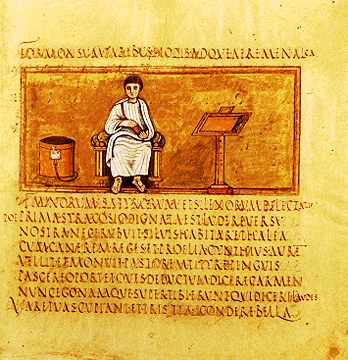
The Aeneid Summaries

5th Century Portrait of Virgil
Book I: Aeneas encounters a storm and is cast ashore at Carthage.
Aeneas and the Tempest
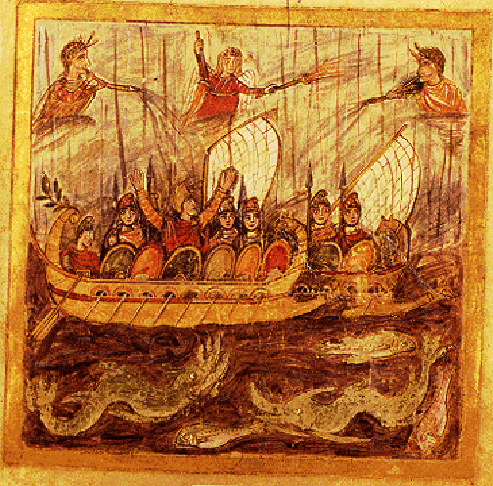
Dryden's Summary: The Trojans, after a seven years' voyage, set sail for Italy, but are overtaken by a dreadful storm, which Aeolus raises at Juno's request. The tempest sinks one ship, and scatters the rest. Neptune drives off the winds, and calms the sea. Aeneas, with his own ship, and six more, arrives safe at an African port. Venus complains to Jupiter of her son's misfortunes. Jupiter comforts her, and sends Mercury to procure him a kind reception among the Carthaginians. Aeneas, going out to discover the country, meets his mother in the shape of a huntress, who conveys him in a cloud to Carthage, where he sees his friends whom he thought lost, and receives a kind entertainment from the queen. Dido, by a device of Venus, begins to have a passion for him, and, after some discourse with him, desires the history of his adventures since the siege of Troy, which is the subject of the two following books.
(Summaries taken from book introductions to John Dryden's classic translation of the Aeneid: spelling is regularized to modern conventions, and an occasional phrase or piece of syntax as well.)
Principal New Characters:
Juno: Wife of the head god Jupiter, Roman equivalent of Hera: hostile (still!) to the Trojans.
Aeolus: God of the winds. Neptune: God of the sea, Roman equivalent to Poseidon. Venus: Goddess of love, and mother of Aeneas, Roman equivalent to Aphrodite. Aeneas: Our Hero, and son of Venus. Cupid: Another, very different son of Venus. He inspires love in Dido for Aeneas. Ascanius or Iulus: Son of Aeneas, for whom Venus substitutes Cupid in the meeting with Dido. Dido: Queen of Carthage, who falls in love with Aeneas. Carthage: A city in North Africa, historically the great rival of Rome in the critical period of the third and second centuries B.C. The defeat of Carthage marked the end of serious opposition around the Mediterranean to Roman power, and led to the consolidation of power we know as the "Roman Empire". Troy: The home of Aeneas Tyre: The original home of Dido, before she fled her brother Pygmalion (who murdered her husband Sychaeus)
Book II: The Hero Tells Dido of his Escape from Troy
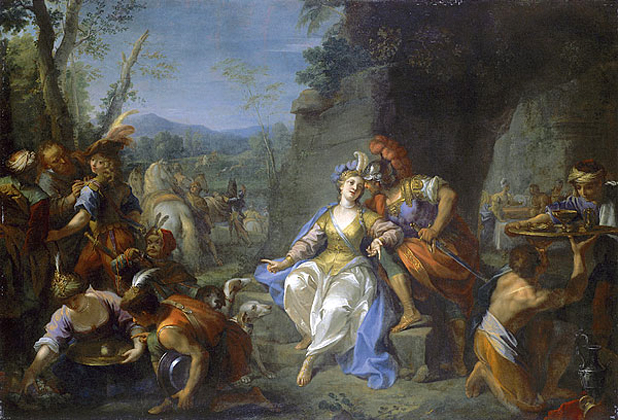
Dryden's Summary: Aeneas relates how the city of Troy was taken, after a ten years' siege, by the treachery of Sinon, and the stratagem of a wooden horse. He declares the fixed resolution he had taken not to survive the ruins of his country, and the various adventures he met with in the defense of it. At last, having been before advised by Hector's ghost, and now by the appearance of his mother Venus, he is prevailed upon to leave the town, and settle his household gods in another country. In order to do this, he carries off his father on his shoulders, and leads his little son by the hand, his wife following him behind. When he comes to the place appointed for the general rendezvous, he finds a great confluence of people, but misses his wife whose ghost afterwards appears to him, and tells him the land which was designed for him.
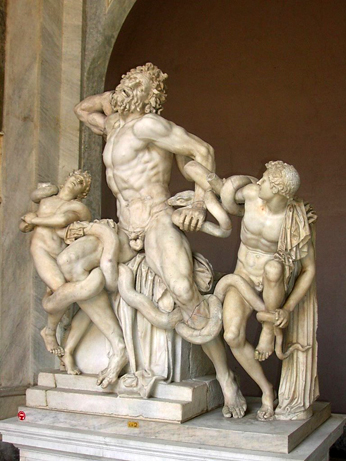
Laocoön was the Trojan priest who attempted to warn Troy not to accept the Horse.
The statue portrays Laocoön and his two young sons being attacked by snakes. The snakes or serpents
who represent the Greeks returning secretly from Tenedos to destroy Troy. The work is very powerful.
Principal New Characters:
Laocoon: Priest of Neptune, killed by the serpents.
Sinon: The clever Greek.
Cassandra: Daughter of Priam, prophetess who will never be believed.
Creusa: Aeneas' wife.
Book III: The Wanderings of Aeneas - Harpies, meeting with Helenus. Death of father Anchises.
Aeneas and his Companions Fighting the Harpies
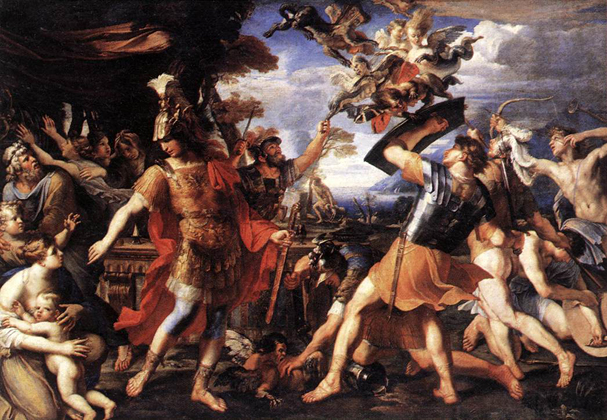
Dryden's Summary: Aeneas proceeds with his story. He gives an account of the fleet with which he sailed, and the success of his first voyage to Thrace. From there he directs his course to Delos, and asks the oracle what place the gods had appointed for his habitation. By a mistake of the oracle's answer, he settles in Crete; his household gods give him the true sense of the oracle, in a dream. He follows their advice, and makes the best of his way to Italy. He is cast on several shores, and meets with very surprising adventures, till at length he lands on Sicily, where his father Anchises dies. This is the place which he was sailing from, when the tempest rose, and threw him upon the Carthaginian coast.
Wandering Aeneas
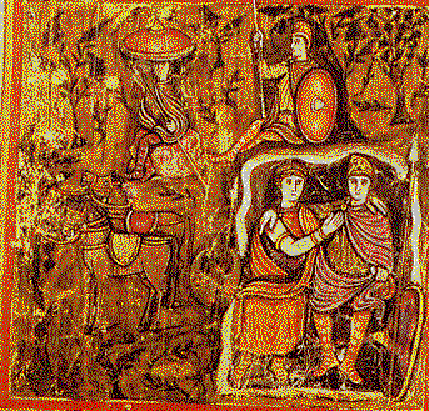
Principal New Characters:
Polydorus: Son of Priam murdered in Thrace.
Celaeno: Harpy who prophesies that the Trojans will starve to the point that they eat their tables.
Helenus: Trojan seer and inheritor of the Kingdom of Pyrrhus.
Andromache: Former wife of Hector, then slave of Pyrrhus, now wife of Helenus.
Acestes: Friendly king of a land in Sicily.
Book IV: Dido's passion for Aeneas. At Jupiter's command, Aeneas departs. Dido kills herself.
Dido on her Funeral Pyre
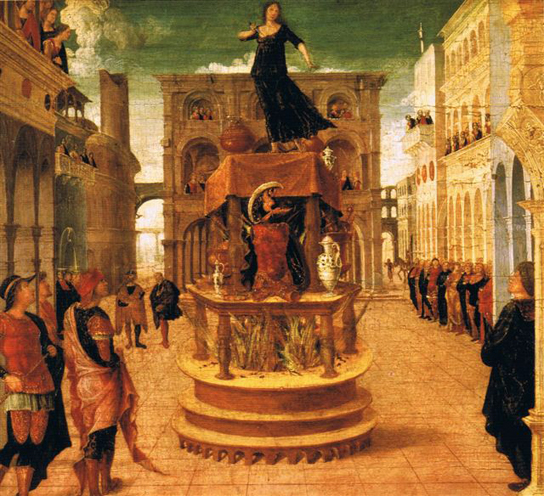
Dryden's Summary: Dido reveals to her sister her passion for Aeneas, and her thoughts of marrying him. She prepares a hunting match for his entertainment. Juno, by Venus's consent, raises a storm, which separates the hunters, and drives Aeneas and Dido into the same cave, where their marriage is supposed to be completed. Jupiter dispatches Mercury to Aeneas, to warn him from Carthage. Aeneas secretly prepares for his voyage. Dido finds out his design, and, to put a stop to it, makes use of her own and her sister's entreaties, and reveals all the variety of passions that are incident to a neglected lover. When nothing would prevail upon him, she contrives her own death, with which this book concludes.
Dido's Suicide
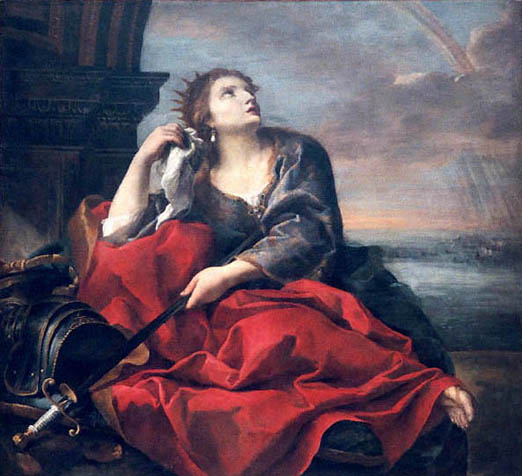
Dido, also called Elissa, was princess of Tyre in Phoenicia. Escaping tyranny in her country, she came to Libya where she founded Carthage, a great city which Aeneas and his comrades, who had become refugees after the sack of Troy, visited seven years after the end of the Trojan War. As Queen of Carthage, she received the Trojans exiles with hospitality, and having given Aeneas more love than he could take, felt betrayed when he left for Italy, and committed suicide.
Principal New Characters:
Anna: Dido's Sister
Mercury: Messenger of Jupiter
Iarbas: African Chieftain
Proserpina: (=Persephone in Greek), Queen of the Underworld
Book V: Aeneas Reaches Sicily. Funeral Games for Anchises.
Boxing Scene, Book V
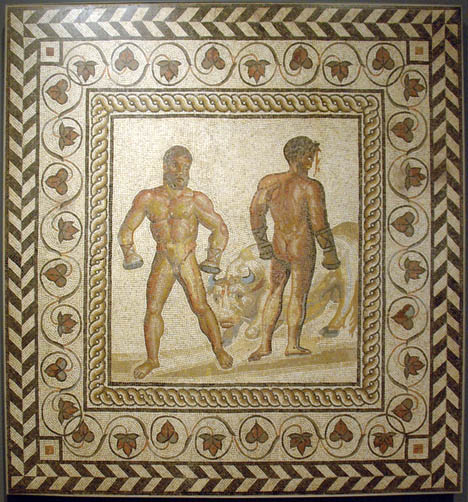
Boxing scene from the Aeneid (Book V), mosaic floor from a
Gallo-Roman Villa in Villelaure (France), ca. 175 AD, Getty Villa
Dryden's Summary: Aeneas, setting sail from Africa, is driven by a storm on the coasts of Sicily, where he is hospitably received by his friend Acestes, king of part of the island, and born of Trojan parentage. He applies himself to celebrate the memory of his father with divine honors, and accordingly institutes funeral games, and appoints prizes for those who should conquer in them. While the ceremonies were performing, Juno sends Iris to persuade the Trojan women to burn the ships, who, upon her instigation, set fire to them; which burned four, and would have consumed the rest, had not Jupiter, by a miraculous shower, extinguished it. Upon this, Aeneas, by the advice of one of his generals, and a vision of his father, builds a city for the women, old men, and others, who were either unfit for war, or weary of the voyage, and sails for Italy. Venus procures from Neptune a safe voyage for him and all his men, excepting only his pilot Palinurus, who is unfortunately lost.
Principal New Characters:
Euryalus: Young "toy boy" friend of Nisus
Nisus: Friend of Euryalus (you'll see this pair again!)
Book VI: Aeneas at Cumae. He meets Anchises in the underworld.
Aeneas at Cumae
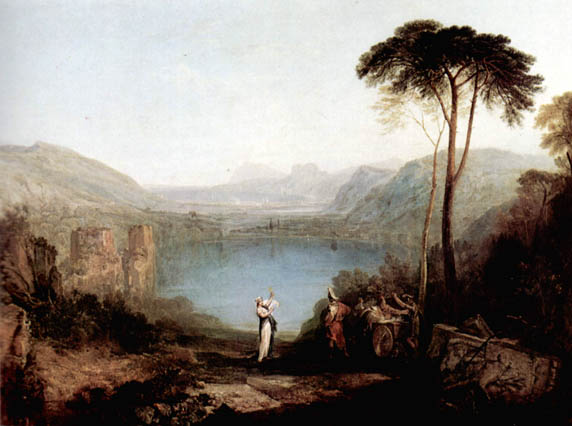
Dryden's Summary: The Sibyl foretells Aeneas the adventures he should met with in Italy. She attends him to hell; describing to him the various scenes of that place, and conducting him to his father Anchises, who instructs him in those sublime mysteries of the soul of the world, and the transmigration; and shows him that glorious race of heroes which was to descend from him, and his posterity.
Aeneas in the Underworld
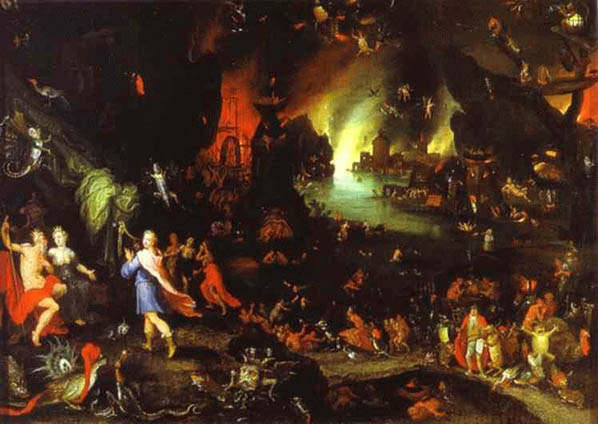
At last, the Trojan fleet arrives on the shores of Italy. The ships drop anchor off the coast of Cumae, near modern-day Naples. Following his father's instructions, Aeneas makes for the Temple of Apollo, where the Sibyl, a priestess, meets him. She commands him to make his request. Aeneas prays to Apollo to allow the Trojans to settle in Latium. The priestess warns him that more trials await in Italy: fighting on the scale of the Trojan War, a foe of the caliber of the Greek warrior Achilles, and further interference from Juno. Aeneas inquires whether the Sibyl can gain him entrance to Dis, so that he might visit his father's spirit as directed. The Sibyl informs him that to enter Dis with any hope of returning, he must first have a sign. He must find a golden branch in the nearby forest. She instructs him that if the bough breaks off the tree easily, it means fate calls Aeneas to the underworld. If Aeneas is not meant to travel there, the bough will not come off the tree.
Aeneas looks in dismay at the size of the forest, but after he says a prayer, a pair of doves descends and guides him to the desired tree, from which he manages to tear the golden branch. The hero returns to the priestess with the token, and she leads him to the gate of Dis.
Just inside the gate runs the river Acheron. The ferryman Charon delivers the spirits of the dead across the river; however, Aeneas notices that some souls are refused passage and must remain on the near bank. The Sibyl explains that these are the souls of dead people whose corpses have not received proper burial. With great sadness, Aeneas spots Palinurus among the undelivered. Charon explains to the visitors that no living bodies may cross the river, but the Sibyl shows him the golden branch. Appeased, Charon ferries them across. On the other side, Aeneas stands aghast, hearing the wailing of thousands of suffering souls. The spirits of the recently deceased line up before Minos for judgment.
Nearby are the Fields of Mourning, where those who died for love wander. There, Aeneas sees Dido. Surprised and saddened, he speaks to her, with some regret, claiming that he left her not of his own will. The shade of the dead queen turns away from him toward the shade of her husband, Sychaeus, and Aeneas sheds tears of pity.
Aeneas continues to the field of war heroes, where he sees many casualties of the Trojan War. The Greeks flee at first sight of him. The Sibyl urges Aeneas onward, and they pass an enormous fortress. Inside the fortress, Rhadamanthus doles out judgments upon the most evil of sinners, and terrible tortures are carried out. Finally, Aeneas and the Sibyl come to the Blessed Groves, where the good wander about in peace and comfort. At last, Aeneas sees his father. Anchises greets him warmly and congratulates him on having made the difficult journey. He gladly answers some of Aeneas's many questions, regarding such issues as how the dead are dispersed in Dis and how good souls can eventually reach the Fields of Gladness. But with little time at hand, Anchises presses on to the reason for Aeneas's journey to the underworld-the explication of his lineage in Italy. Anchises describes what will become of the Trojan descendants: Romulus will found Rome, a Caesar will eventually come from the line of Ascanius, and Rome will reach a Golden Age of rule over the world. Finally, Aeneas grasps the profound significance of his long journey to Italy. Anchises accompanies Aeneas out of Dis, and Aeneas returns to his comrades on the beach. At once, they pull up anchor and move out along the coast.
Principal New Characters:
Palinurus: The Helmsman
Sibyl: The priestess of Apollo at Cumae, who acts as Aeneas' guide down into the Underworld.
Deiphobus: The Trojan who wed Helen after Paris' death, for which his body was mutilated by the Greeks.
Styx: Main river of the Underworld
Lethe: (Means "forgetfulness" in Greek), River in the Underworld where souls drink to forget their past lives before returning to the world above.
Romulus: Legendary first King of Rome itself, nurtured with his brother Remus by a she-wolf, and thus emblematic of Rome's hardy beginnings.
Marcellus: Nephew and presumed heir to Augustus, who died unexpectedly in 23 BC, shortly before this passage was written.
Book VII: Aeneas lands in Latium. Latinus promises Lavinia. Juno stirs up war. Catalogue of Italian Heroes.
Aeneas in the Court of Latinus
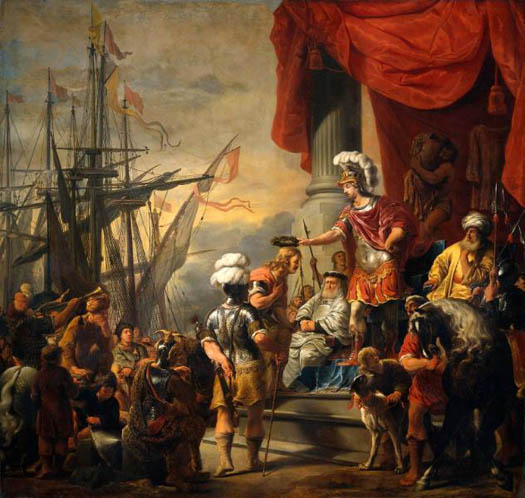
Dryden's Summary: King Latinus entertains Aeneas, and promises him his only daughter, Lavinia, the heiress of his crown. Turnus, being in love with her, favored by her mother, and stirred up by Juno and Alecto, breaks the treaty which was made, and engages in his quarrel Mezentius, Camilla, Messapus, and many others of the neighboring princes; whose forces, and the names of their commanders, are here related in a catalogue.
Principal New Characters:
Alecto: A Fury
Latium: The kingdom of Latinus, where the Latins live, and where Aeneas will eventually found Lavinium.
Latinus: King of Latium
Lavinia: Daughter of Latinus, and destined to be the wife of Aeneas, and his fellow ruler over Lavinium (named after her).
Turnus: Ruler of the Rutulians, and principal foe of Aeneas.
Mezentius: Godless ruler of the Etruscans, another principal foe (we'll see more of him later, esp. Book X).
Camilla: An Amazon-like female warrior, another of Turnus' principal allies.
Book VIII: Aeneas secures the help of Evander and the Etruscans. Story of Hercules and Cacus. Armor from Vulcan.
Evander and Aeneas at Palentium
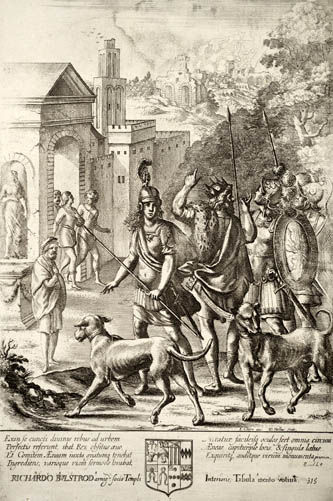
Dryden's Summary: The war being now begun, both the generals make all possible preparations. Turnus sends to Diomedes. Aeneas goes in person to beg aid from Evander and the Tuscans (=the Etruscans). Evander receives him kindly, furnishes him with men, and sends his son Pallas with him. Vulcan, at the request of Venus, makes arms for her son Aeneas, and draws on his shield the most memorable actions of his posterity.
Principal New Characters:
Evander: Local King (of Pallanteum) who sides with Aeneas against the Latins, and suggests the Etruscans as allies.
Pallas: The son of Evander (he will become a Patroclus-like figure: watch for this!)
Cacus: A man-eating, fire-breathing monster defeated and killed by Hercules for stealing his cattle.
Vulcan: Husband of Venus, maker of the arms.
Cyclops: Helpers of Vulcan at the forge (note how different from Homer's Cyclopes!)
Actium, 31 BC: The critical victory of Octavian (soon to be Augustus) Caesar over the opposing forces of Marc Antony (=Antonius in your text) and Cleopatra: this is the central scene in Aeneas' shield.
Book IX: Turnus attacks the Trojan camp. Nisus and Euryalus. The camp is hard pressed.
Nisus and Euryalus
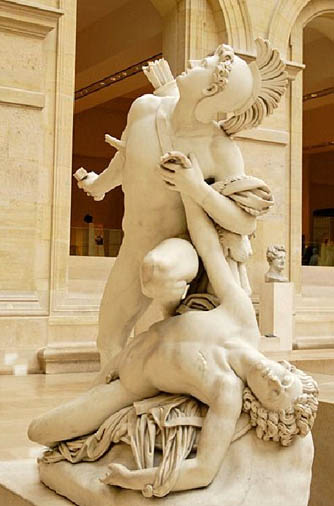
When the Trojans are holding funeral games for Aeneas' father, it is his love for Euryalus that drives Nisus to perform in the foot race. When Nisus slips in the blood where the animals were sacrificed, he trips another runner to allow Euryalus to win the race. Later, while Aeneas is away from the Trojan camp, Nisus and Euryalus propose a covert night-mission to the other generals. Breaking into the Rutulians' camp, they are able to get the better of dozens of drunk, dozing enemies, but they get carried away, gathering the spoils of the defeated. Euryalus is spotted and captured, and Nisus is forced to watch from a hiding place as his friend is executed. Enraged, he descends on Euryalus' murderer, Volcens, killing several Rutulians but dying himself in the process.
Dryden's Summary: Turnus takes advantage of Aeneas's absence, fires some of his ships (which are transformed into sea nymphs), and assaults his camp. The Trojans, reduced to the last extremities, send Nisus and Euryalus to recall Aeneas; which furnishes the poet with that admirable episode of their friendship, generosity, and the conclusion of their adventures.
Principal New Characters:
Nisus and Euryalus Revisited: Review their appearance earlier, in Book V.
Book X: Fight continues. Tuscan catalogue. Turnus kills Pallas. Juno saves Turnus from raging Aeneas. Aeneas kills Mezentius.
Turnus Kills Pallas
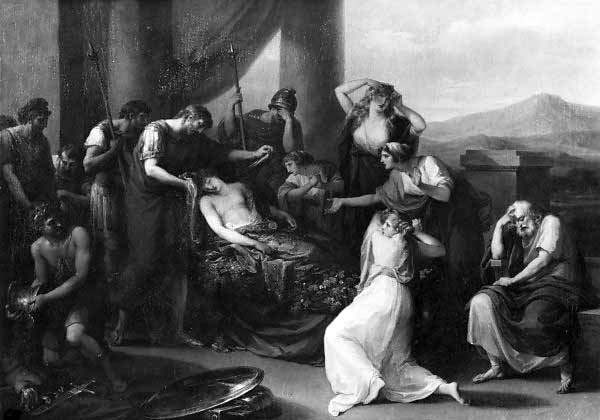
Dryden's Summary: Jupiter, calling a council of the gods, forbids them to engage in either party. At Aeneas' return there is a bloody battle: Turnus killing Pallas; Aeneas, Lausus and Mezentius. Mezentius is described as an atheist; Lausus as a pious and virtuous youth. The different actions and death of these two are the subject of a noble episode.
Aeneas' Fight with Mezentius and Lausus
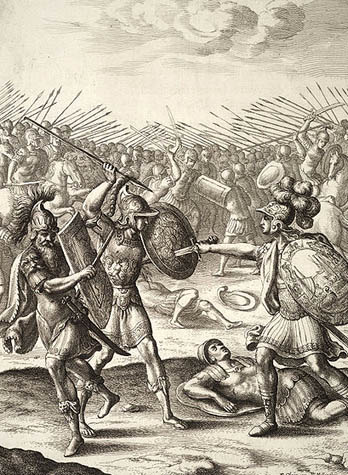
Principal New Characters:
Pallas: The son of Evander (to what Iliadic figure does he seem to compare?)
Lausus: The virtuous Son of Mezentius
Mezentius: Former King of the Etruscans (=Tuscans), so evil that the Etruscans drove him out and fight against him alongside Aeneas; a godless man.
Book XI: Burial of Pallas. Diomedes' refusal. Council: Drances abuses Turnus. The Trojans attack. Death of Camilla.
Dryden's Summary: Aeneas erects a trophy of the spoils of Mezentius, grants a truce for burying the dead, and sends home the body of Pallas with great solemnity. Latinus calls a council, to propose offers of peace to Aeneas; which occasions great animosity between Turnus and Drances. In the meantime there is a sharp engagement of the horse; wherein Camilla shows herself remarkable; is killed; and the Latin troops are entirely defeated.
Aeneas Erects a Trophy of the Weapons of Mezentius
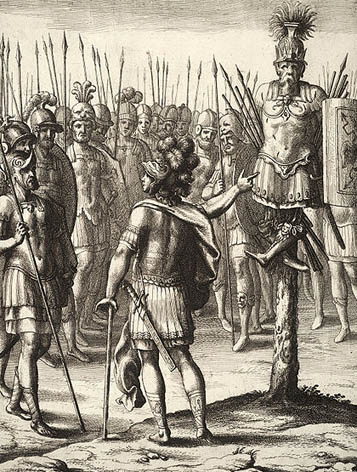
Principal New Characters:
Drances: Latin elder who does not fight, but is an enemy of Turnus and an advocate of peace with the Trojans.
Camilla: An Amazon-like Volscian maiden warrior, ally of Turnus.
Book XII: Single combat arranged, but treachery provokes a general engagement. Trojans attack the city. In single combat, Aeneas kills Turnus.
The Death of Turnus

Dryden's Summary: Turnus challenges Aeneas to a single combat - articles are agreed on, but broken by the Rutulians, who wound Aeneas. He is miraculously cured by Venus, forces Turnus to a duel, and concludes the poem with his death.
Principal New Characters: None
Source: Study Guide - The Aeneid
Return to Persona Historiae
Return to Pagina Artis
Return to Bruce and Bobbie's Main Page.